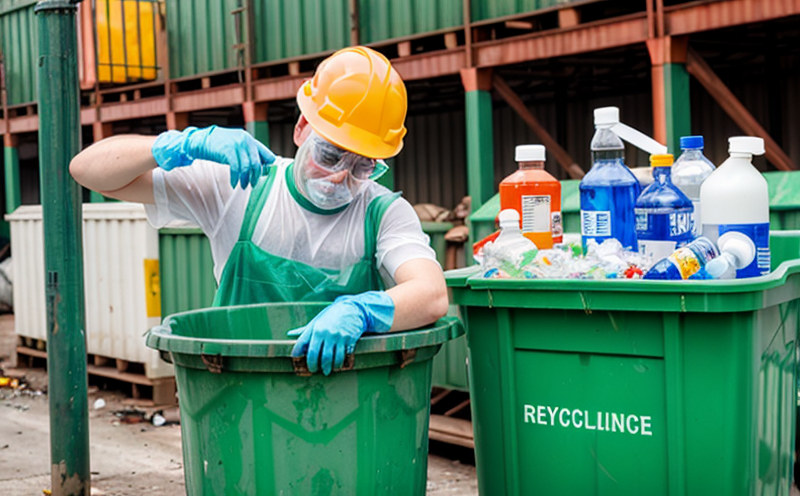Thermogravimetric Analysis TGA Test
The Thermogravimetric Analysis (TGA) test is a critical analytical technique widely used in chemical testing to study the thermal behavior of materials. This method quantifies mass changes during heating, cooling, or other temperature-related processes. It provides detailed insights into the stability and composition of waste and recycled materials, which are crucial for ensuring compliance with regulatory standards.
In the context of waste and recycling, TGA is particularly valuable as it helps identify the volatilization points and decomposition temperatures of different components within a material mixture. This information is vital for understanding how waste materials will behave under various processing conditions or environmental factors. By conducting TGA tests on waste streams, industries can optimize their recycling processes, ensuring that only stable and safe compounds are reintroduced into the manufacturing cycle.
The test involves precise temperature control and accurate mass measurement. Samples are heated at a controlled rate while being weighed continuously. As temperatures rise, any volatilization or decomposition leads to a decrease in sample weight, which is recorded as an output. This data allows for the identification of specific phases within a material, aiding in the determination of its purity, composition, and potential reusability.
For quality managers and compliance officers, TGA provides critical insights into the reliability and consistency of recycled materials. By ensuring that these materials meet stringent standards, companies can maintain their reputation for sustainability and environmental responsibility. For R&D engineers, TGA offers a tool to innovate new recycling processes that enhance both efficiency and product quality.
The scope of TGA testing in waste and recycling is broad, encompassing everything from electronic waste to construction debris. Understanding the thermal stability of these materials can lead to more effective recovery strategies and reduced environmental impact. The test also supports procurement efforts by validating the suitability of recycled inputs for manufacturing processes.
- Customer Impact: Improved product quality, enhanced recycling efficiency, and compliance with environmental regulations.
- Sustainability Contributions: Reduction in raw material consumption, minimization of waste, and promotion of circular economy principles.
Why It Matters
The importance of TGA testing in the context of waste and recycling cannot be overstated. As industries increasingly focus on sustainability and resource recovery, accurate characterization of recycled materials is essential for ensuring their safe and effective reuse. TGA provides a robust framework for understanding how different components within a material will behave under varying temperatures.
For quality managers and compliance officers, the test results offer critical data to substantiate claims of recycled content in products. This transparency builds trust with consumers and stakeholders, enhancing brand reputation. R&D engineers rely on TGA findings to refine processes that optimize resource recovery while minimizing environmental impact. By identifying the optimal conditions for processing waste materials, they can develop more efficient recycling methods.
The test also plays a pivotal role in meeting regulatory requirements set by governing bodies such as ISO and ASTM. Compliance with these standards ensures that recycled materials are safe for use across various industries, from electronics to construction. This alignment not only reduces the risk of product liability but also fosters innovation by encouraging the development of new, sustainable technologies.
In addition to its regulatory benefits, TGA testing supports sustainability efforts by promoting a circular economy model. By ensuring that waste materials are processed in a way that preserves their integrity and reusability, industries can significantly reduce their carbon footprint. This focus on resource conservation aligns with global initiatives aimed at reducing landfill usage and mitigating climate change.
Customer Impact and Satisfaction
The implementation of TGA testing has led to significant improvements in customer satisfaction across various sectors. By ensuring that recycled materials meet stringent quality standards, companies can enhance the performance and reliability of their products. This not only satisfies regulatory requirements but also enhances brand reputation by demonstrating a commitment to sustainability.
- Enhanced Quality: Products made from recycled materials are consistently reliable, leading to customer trust and loyalty.
- Regulatory Compliance: Meeting international standards ensures that products can be sold globally without legal issues.
- Sustainability: By promoting a circular economy model, TGA testing supports environmental initiatives, reducing the carbon footprint of manufacturing processes.
Customers appreciate the transparency and reliability provided by TGA results. They understand that these tests ensure the highest quality recycled materials are used in their products, leading to better performance and longevity. This focus on sustainability also aligns with broader corporate social responsibility (CSR) goals, further enhancing customer satisfaction.
Environmental and Sustainability Contributions
TGA testing plays a vital role in supporting environmental and sustainability efforts by promoting resource conservation and reducing waste. By ensuring that recycled materials are processed under optimal conditions, industries can significantly minimize their impact on the environment. This focus on sustainability aligns with global initiatives aimed at mitigating climate change and preserving natural resources.
The use of TGA testing contributes to a circular economy model, where materials are continuously reused and recycled without significant loss in quality or functionality. This reduces reliance on virgin raw materials, which is crucial for reducing greenhouse gas emissions associated with their extraction and processing.
By optimizing recycling processes through TGA data, industries can minimize waste generation and landfill use. This not only supports environmental goals but also contributes to resource efficiency, leading to significant cost savings in the long term. The test results help companies make informed decisions that balance economic viability with environmental responsibility.





